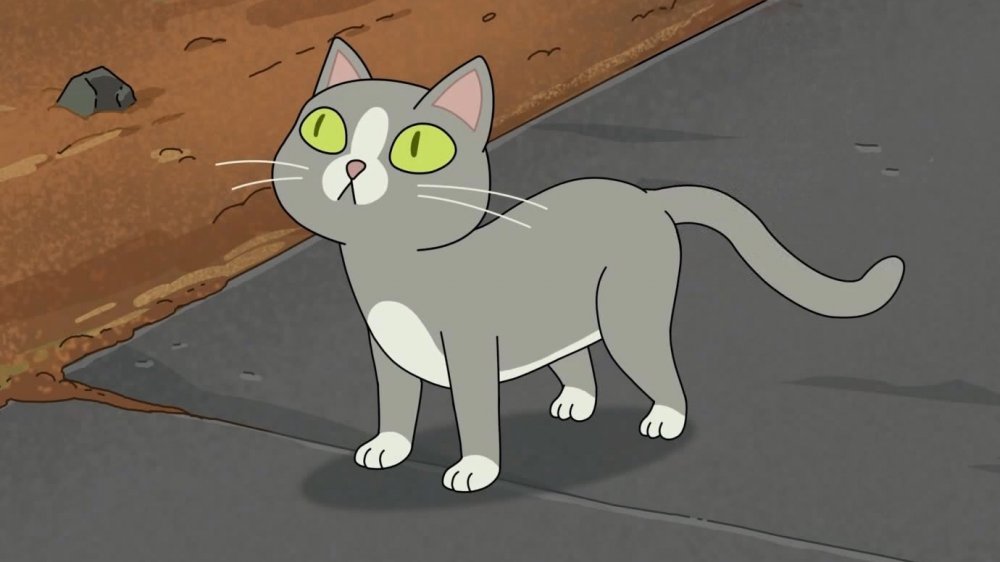The Truth About Rick And Morty's Talking Cat
Not unlike its titular protagonists' psychological baggage, episodes of Adult Swim's animated series Rick and Morty can be a lot to unpack. Between all the high-concept science fiction elements, layers upon layers of literary homage, and a thick candy coating of theoretical physics, one could be forgiven for missing a few of the show's more esoteric elements. One such plot device, featured prominently on the season 4 episode "Claw and Hoarder: Special Ricktim's Morty," is the talking cat (voiced by none other than Ferris Bueller's Day Off actor Matthew Broderick) who leads Jerry on a spring break adventure in south Florida.
When Jerry first encounters the cat, sitting placidly on his bed in the house, a handful of rational-ish explanations jump to mind. Perhaps the cat is a robot, built in Jerry's own garage by Rick. Perhaps the cat is just a cat, but one that Rick has imbued with super intelligence and the power of speech. Or maybe, the cat is an emissary from another planet populated by talking cats, or another dimension where cats evolved to domesticate humans. Any and all of these explanations seem plausible within the context of Rick and Morty, but viewers hoping for an explanation were left in the lurch after Rick's adamant denial of any involvement with talking cat-related activities. So... was he telling the truth?
Is the talking cat a rare abnormal event unrelated to Rick?
Of course, Rick could always be lying. Occam's razor seems to suggest that Rick is, in fact, lying. Rick lies frequently and capriciously, sometimes with the best interests of the universe in mind, but other times just to mess with his family or maintain his own narcissistic cover. (See: the season 3 episode "Morty's Mind Blowers," wherein Rick alters his grandson's memory to erase the moment he mistakenly uses the phrase "taken for granite" instead of "granted.") If Rick had lied to Jerry about the origins of the cat, that would bring all the previously mentioned rational explanations back into play, but in this instance it just doesn't seem likely.
To elaborate: Rick is, first and foremost, a toxic narcissist, and that's putting his psychiatric diagnosis generously. Rick has done all kinds of terrible things, and he's certainly not above designing a talking cat just to mess with his idiot son-in-law. But if that was the goal, history suggests he wouldn't have been able to resist a gloating reveal. When Rick finally reunites with Jerry towards the end of the episode, he has to deploy a Schrodinger's Box to divine the hidden backstory of this mysterious feline. Whatever horrors hid in that cat's checkered past, they seemed to have an authentic effect on both Rick and Jerry: Jerry doubles over and vomits, while Rick curses his own curiosity.
The talking cat and Rick and Morty fandom
Think about that for a second: whatever this cat did in its previous life shook Rick Sanchez to his rotten core. He even goes so far as to alter Jerry's memory of the event (thank you, Brainalyzer). It just doesn't seem plausible that Rick would fake this entire reveal; Rick and Jerry's reactions were too raw, too authentic. It seems that we really might have "an abnormal event unrelated to Rick" on our hands.
On a thematic level, Jerry's adventure with the talking cat ties into the episode's satire of competing fandoms and nerd culture at large. Jerry's anti-adventure in south Florida with the talking cat serves as a narrative counterpoint to the fantasy hijinks taking place in the A-story; while Rick, Morty, and Summer argue over the merits of fantasy storytelling and come to appreciate the utter lameness of their dragon obsession, Jerry and the cat gallivant off to the Sunshine State, a place where everyone's out to have a good time and nobody asks any questions. Questions like, "Why the hell is this cat talking?"
What you don't know can't hurt you
Viewed in light of this impressive storytelling sleight-of-hand, a full explanation of the cat's origins and motives would actually undermine the theme of the episode. That last scene where Jerry and Rick are tormented by their glimpse into the talking cat's tragic past serves to underscore the dangers of asking too many geeky questions. Consider each storyline's relative conclusion: Rick, Morty, and Summer have to let go and live in the moment to enjoy their romp through the fantasy world of orgiastic dragons. On the flip side: Jerry and the cat's spring break is going just fine, until the cat party fouls by asking way too many questions. Then, Rick shows up, and they both get punished for digging too deeply for answers.
In storytelling, as in life, there's such a thing as too much information. In the mystery lies much of the fun... which makes this article a sort of meta-commentary on fandom's compulsive need to overanalyze minutiae and explain away every last scrap of a fantastical story's mystique. If you find yourself disappointed by the explanation, maybe you can borrow Rick's brainalyzer and restore yourself to ignorant bliss.



